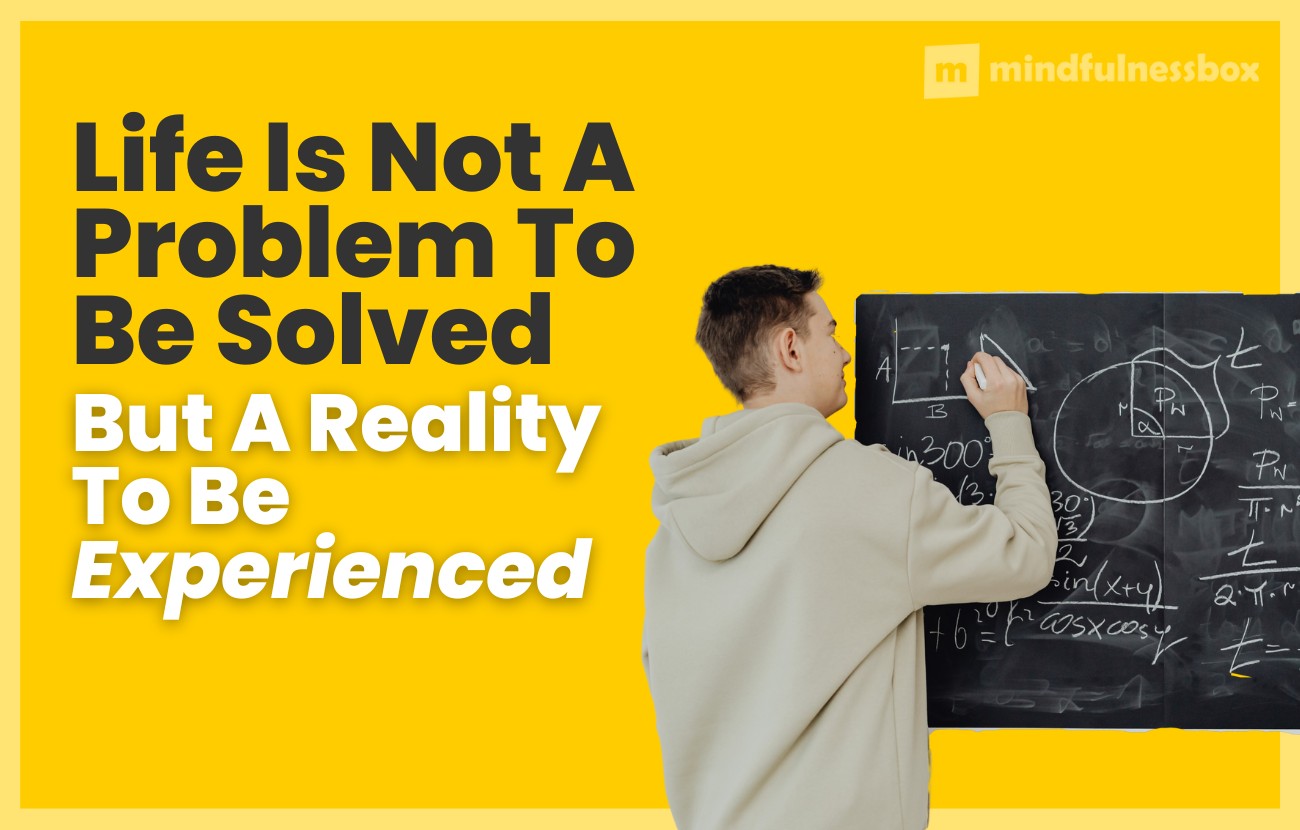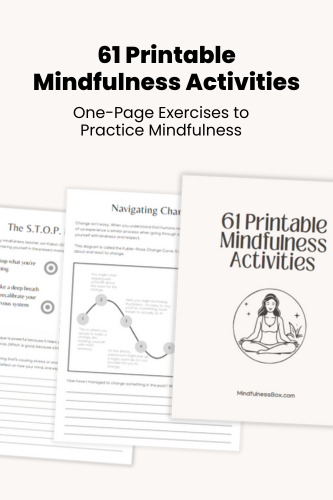According to Danish philosopher Søren Kierkegaard, “Life is not a problem to be solved, but a reality to be experienced.” Kierkegaard, along with other philosophers like Alan Watts and Rainer Maria Rilke, have argued that when you seek the answers to life, you’re asking the wrong question. Life is something to be experienced, not something to be solved.
What’s the meaning of life?
Before you get too excited—sorry, I don’t have the answer.
Get dozens of one-page exercises to help practice mindfulness, meditation, gratitude, and self love. Perfect for printable handouts when teaching mindfulness to groups, students, or in the workplace.
To see examples, plus a full list of the 61 exercises included, click below.
Philosophers have been wrestling with this one for as long as there have been philosophers.
I certainly can’t tell you.
But I do know that people generally fall into a couple camps with this question.
Two approaches to the question “What’s the answer to life?”
For some, there simply has to be an answer. Life can be difficult and uncertain. If we don’t know the point to it all, it’s easy to fall into existential dread.
For people who feel this way, the question of why we’re here and the meaning of life needs to be answered with certainty. There exists an answer somewhere out there, so we must pursue it.
For others, the answer is unknowable. It’s like expecting an ant to know who the president is: it’s too many layers beyond understanding.
Perhaps the question itself is unhelpful, because it implies a single answer. Life—our entire experience—is everything around us, past and present. How could there be a single meaning to it?
I started life in the first camp, but now I fall in the second camp. For me, why we’re here, and the meaning of life, aren’t problems to be solved.
Life exists to be experienced.
The meaning of life may be unknowable, and perhaps the question is absurd
Try this question:
What’s the meaning of your dog’s life?
If the question “What’s the meaning of your dog’s life,” sounds absurd, that’s because it’s intended to.
Watching your dog chase its own tail and wondering about the meaning of little Fido’s life is laughable, because the answer is obvious:
Fido’s doing just fine.
He’s here to be a dog, and he’s doing a damn fine job of being a dog.
I’m not suggesting that human lives are equivalent to a dog’s life, or that humans don’t have a unique capacity for purpose, meaning, creation, and existential dread. Certainly, those things are true.
But this tongue-in-cheek question has the potential to help us find a little freedom amidst the absurdity. Let’s apply it to your life:
Are you a human who’s experiencing life? Are you making mistakes, finding inspiration and creating, being brave and being afraid, lying and being honest, experiencing happiness and sadness, starting and then giving up and then trying again?
If so, congratulations.
You’re here to be a human, and you’re doing a damn fine job of being a human.
1. The meaning of life according to Søren Kierkegaard
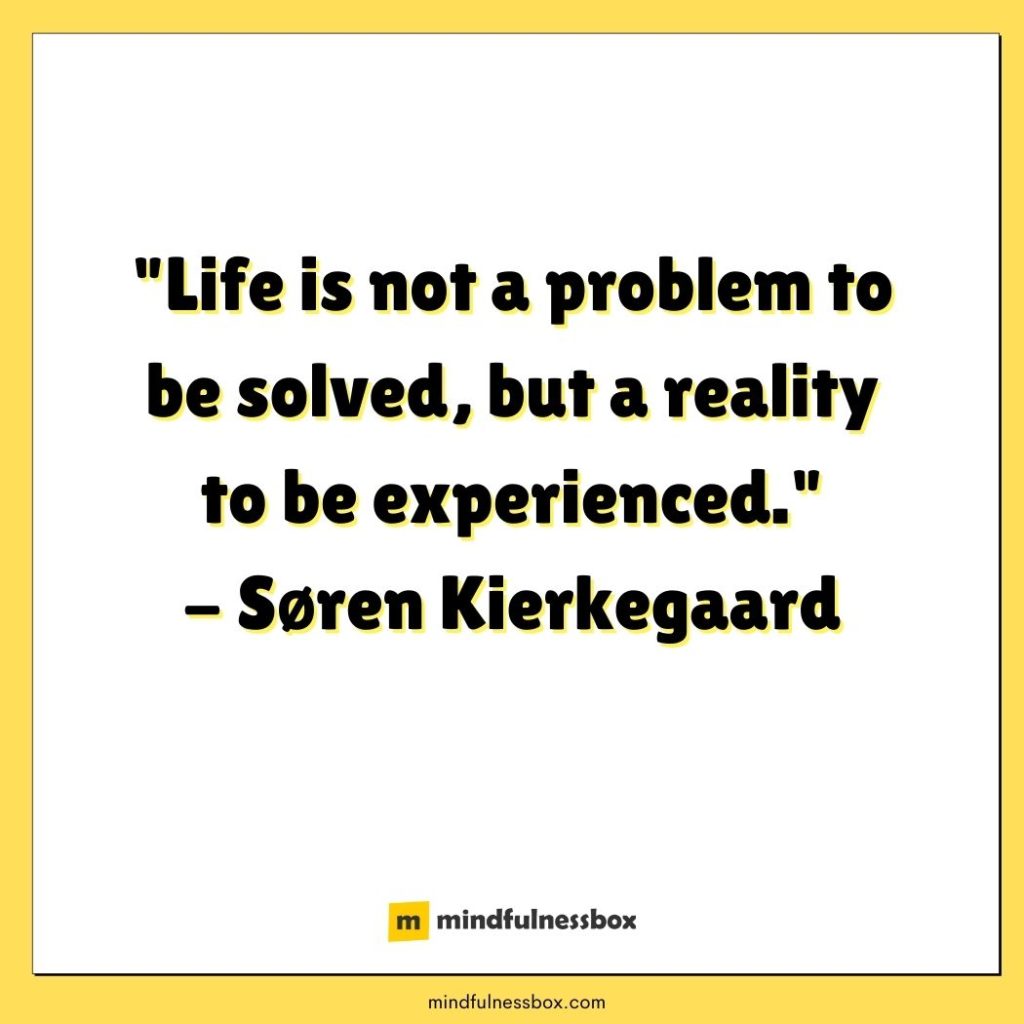
Here’s what Danish philosopher Søren Kierkegaard had to say:
“Life is not a problem to be solved, but a reality to be experienced.”
Of course, this is coming from a philosopher who spent his time considering the great questions of life. But perhaps that makes it more powerful: that a man who considered so many existential questions of life ultimately found that the greatest ones had no satisfactory answers, and we should just get on with living.
Kierkegaard isn’t the only one urging us to stop treating life like a problem.
2. The meaning of life according to Alan Watts
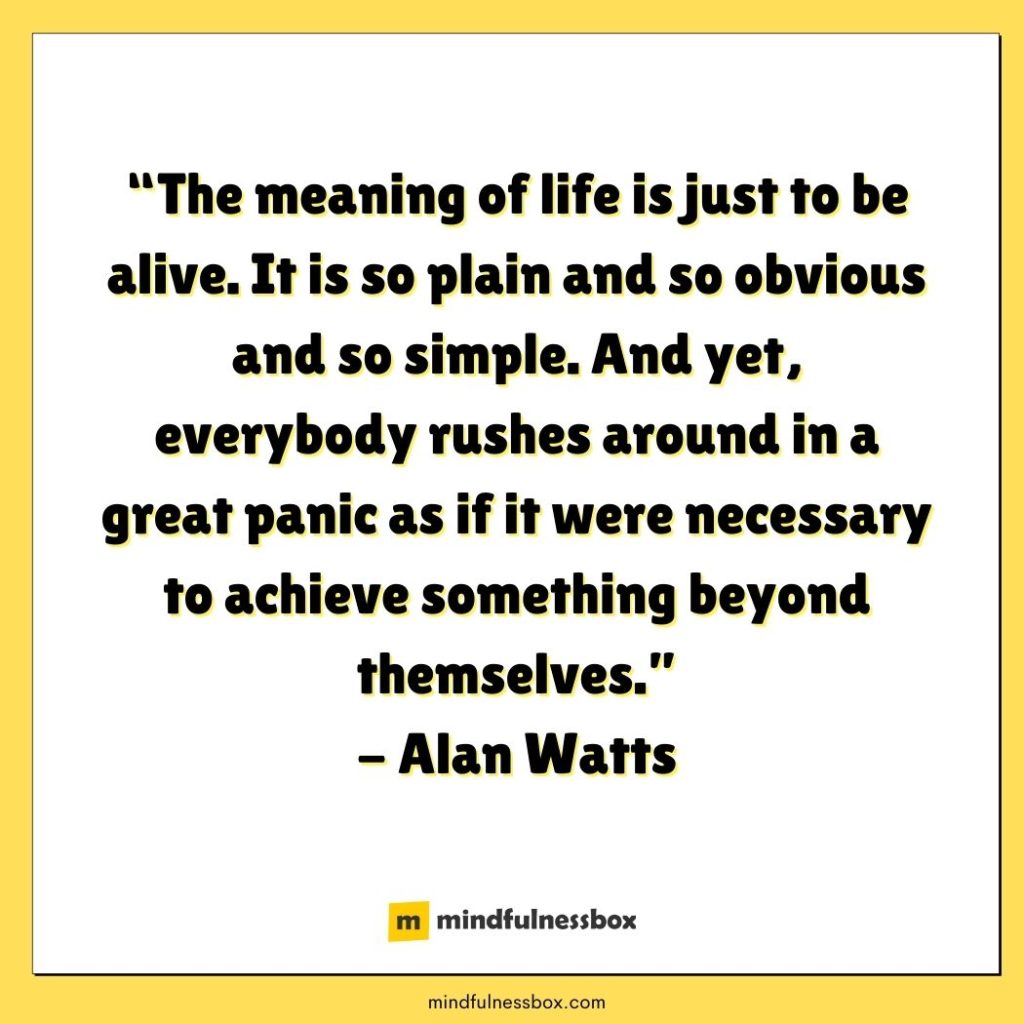
A similar take is found in this perspective from philosopher Alan Watts:
“The meaning of life is just to be alive. It is so plain and so obvious and so simple. And yet, everybody rushes around in a great panic as if it were necessary to achieve something beyond themselves.”
We can use endless energy identifying the meaning of life, and wondering if what we’ve done constitutes a full and meaningful way of living.
Or, we can find a way to content ourselves with the experience of simply being alive. (Of course, internalizing this is no easy task, either).
3. The meaning of life according to Rumi
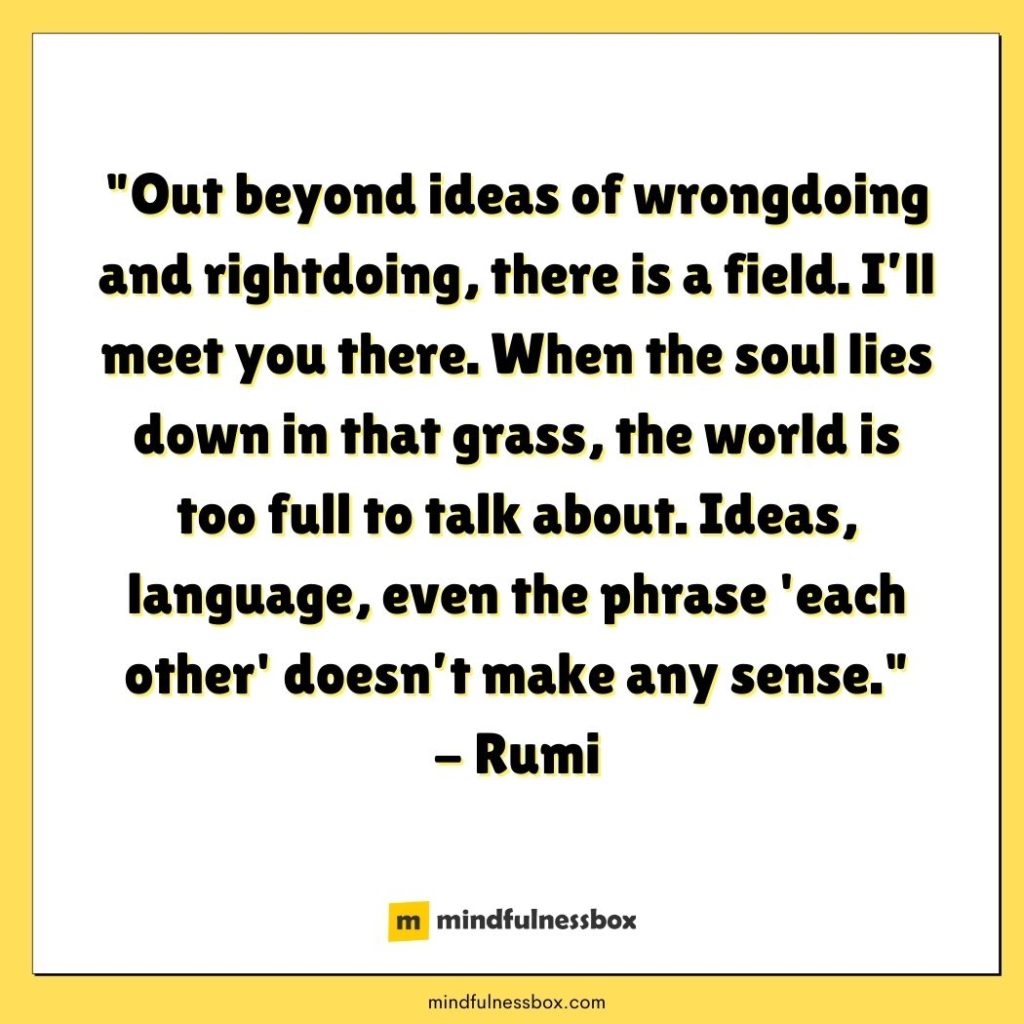
Rumi shows the power of poetry to dance around big questions of meaning, questions that have a tendency to slip away when you try to address them head on:
“Out beyond ideas of wrongdoing and rightdoing, there is a field. I’ll meet you there. When the soul lies down in that grass, the world is too full to talk about. Ideas, language, even the phrase each other doesn’t make any sense.”
Or, put in a different way:
When we find ourselves stuck on paradigms of right and wrong and wrangling with philosophical language and ideas, perhaps it’s better to simply be. To simply absorb the experience of life.
4. The meaning of life according to Rainer Maria Rilke
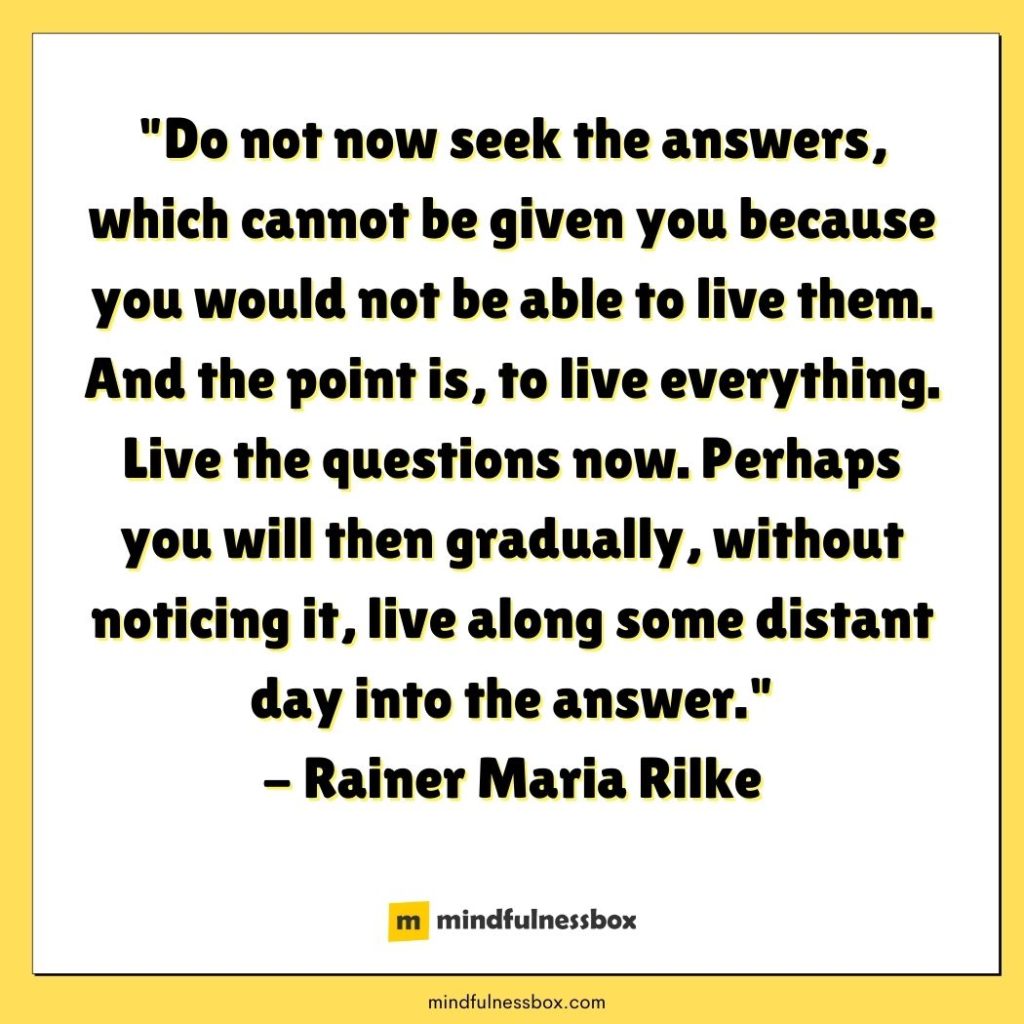
No one addresses the futility of chasing answers to big questions better than Rainer Maria Rilke.
“Do not now seek the answers, which cannot be given you because you would not be able to live them. And the point is, to live everything. Live the questions now. Perhaps you will then gradually, without noticing it, live along some distant day into the answer.”
Maybe it’s too soon for us to have the answers we’re looking for. Or maybe we simply can’t know them at all. Maybe they’re beyond human comprehension—simply unknowable. In any case, the answer again in Rilke’s case is to stop trying to treat life like a problem to be solved, and to start living.
Living with purpose—even when you don’t have all the answers
None of this is to say that meaning, purpose and contribution aren’t something we should seek out in our lives.
Humans need meaning.
But this need tends to lead us, as Alan Watts said, to “[rush] around in a great panic” trying to achieve. Our existential dread causes a deep need to work towards something greater than ourselves—a sort of “immortality project” that will last beyond us.
Yes, build meaning in your life. But do so from a place of security.
The security of knowing that you’re here to simply experience life.
You’re here to be human.
And that’s exactly what you’re doing.

My mindfulness practice kicked off in 2016 with a ten-day silent retreat. Since then, I’ve read dozens of books about mindfulness and completed hundreds of hours of meditation. Thinking about what makes humans happy, calm, and peaceful is endlessly fascinating to me.

